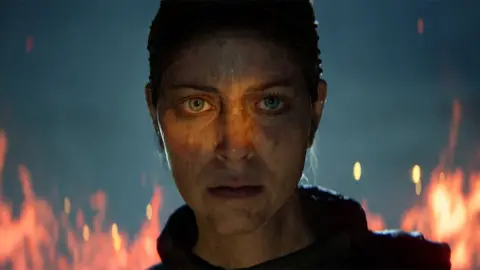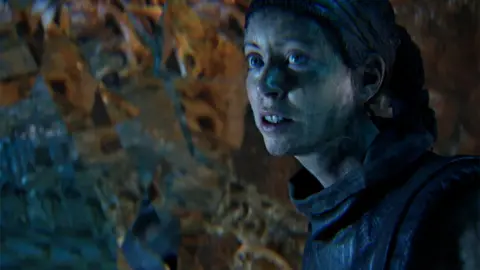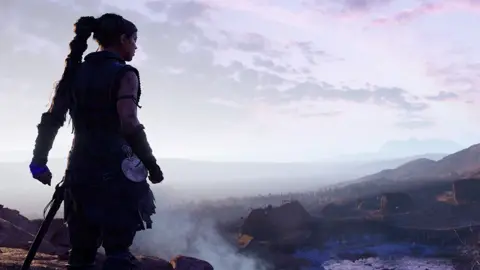Mind games: Hellblade returns to explore psychosis
 Ninja Theory
Ninja TheoryVisit any video game developer a week before their latest big release and there will be questions hanging in the air.
Will people like it? What will the reviews scores be?
But when BBC Newsbeat visits Ninja Theory’s studio a week before Senua’s Saga: Hellblade 2 comes out, there’s another question looming.
Just a few days earlier Microsoft, which acquired the Cambridge-based company in 2018, announced the shock closures of critically acclaimed studios including Prey developer Arkane Austin and Hi-Fi Rush maker Tango Gameworks.
The games from those teams didn't shift as many copies as a Call of Duty, an EA FC or a Hogwarts Legacy, but they were beloved by many. To fans, they mattered.
So what does that mean for Ninja Theory, a developer that very much falls into that category?
Right now, at least, studio head Dom Matthews tells Newsbeat they’ve got something else on their minds.
“We're super-focused on the release of Hellblade 2,” he says.
“We're super-proud of the game that we've created, and we’re just looking forward to spending that day together and fans getting hold of the game and enjoying what we've made.”
It's a day that's been a long time coming.
The studio's previous game, Hellblade: Senua's Sacrifice, came out in 2017, made by a team of about 20 people.
One of them was Melina Juergens, the company's video editor, who ended up taking the starring role of Senua after the original actress dropped out.
"My job has always been to be behind the scenes," she tells Newsbeat.
"So I was terrified to perform in front of people and being in front of the lens."
Despite being a first-time acting job for Melina, she won a Bafta game award for her performance - one of five Ninja Theory took home for Hellblade 1.
It won huge praise for how it handled Senua's psychosis - a condition that can cause people to hear voices, see things that other people don't see and have unique beliefs about the world.
It's also something Melina experienced herself in her early twenties, which she describes as "a time of pure terror".
"I was hearing whispers, and I could see dead people and things like that," she says.
"So it was a very scary time."
Melina says portraying Senua was a chance to "use my experiences to do something useful".
"And it felt almost therapeutic."
 Getty Images
Getty ImagesAccording to Prof Paul Fletcher, a Cambridge University neuroscientist who worked on both games, the media has a patchy track record with psychosis.
While there are some good examples, he says there are also "lots of instances in which psychosis is used as almost a shorthand for somebody behaving in a very crazy, possibly dangerous, violent way.
"And I think that should always be challenged."
Prof Fletcher says he was persuaded to work with Ninja Theory because of their determination to avoid misrepresentation.
He says he also recognised "how valuable video game experiences can be in drawing people in and giving them experiences that they might not otherwise have had".
Both Hellblade games include hallucination sequences and rely heavily on audio to recreate what it's like to live with psychosis.
The Ninja Theory team worked with Prof Fletcher and a group of patients with lived experience to ensure they made the depiction as accurate as possible.
A new journey
The first game was more of a solo quest but Hellblade 2 introduces new characters and explores the effect of Senua’s interactions with them on her psychosis.
Studio head Dom says the goal was to reflect that mental health is often a "journey".
"It's not static," he says, adding that the first game was about Senua "experiencing psychosis and understanding it really for the first time".
This time, he says, she has "a level of understanding and level of acceptance of those experiences.
"They're no less strong, but there's a different balance of power there. So that's been really interesting to explore."
Hellblade 2 is also a step up technologically. Since 2017 the team has moved in to a new, custom-built studio with its own motion-capture stage and audio studios.
The first game also used motion capture, but it was recorded in a board room at the old Ninja Theory office.
 Ninja Theory
Ninja TheoryTo underline the point, Dom says that the team spent two days recording combat footage for the first game. For the second it was 69 days.
They also spent time taking, and sometimes even making, real-life costumes and props to be digitally scanned to boost Hellblade 2's immersion.
And this time the performance capture employed a much larger crew, including stunt co-ordinators and other specialists.
For Melina, returning to the role with a much bigger team was daunting at first.
"It was a lot more eyes on me," she says.
Some scenes, like a swimming sequence early in the game, were physically demanding.
Melina recalls being suspended from the ceiling for the best part of a day.
"You have to really tense all the muscles in your body and you're in a constant plank position," she says.
Both Dom and Melina say that the hard work is worth it in order to spread understanding of psychosis.
As well as the Bafta trophies on the studio shelves and awards certificates on the walls, Ninja Theory also collects accolades from fans who've been moved by their games.
"There were some really lovely quotes in there," says Melina.
"One person was saying that her brother was always embarrassed about her because she was suffering from psychosis.
"And after he played the game, he said he could finally understand her and he apologised to her.
"So things like that are very heartwarming to hear."
 Ninja Theory
Ninja TheoryThere are hundreds of stories like this on forums and social media sites about Hellblade 1.
Dom thinks that there is now a greater focus in the wider games industry on "lived experience finding its way into games and being used as a vehicle to tell people's stories", but he says he's not sure Ninja Theory can take all the credit for that.
Prof Fletcher, though, says he thinks Hellblade has had an impact.
He uses the game as a teaching tool now, and believes it has helped to spread awareness of psychosis.
While he feels like he never had much impact in trying to challenge stigmas on his own, he says the explosion of respectful, thoughtful discussion in response to the first game left him "extraordinarily surprised and excited".
Back to that question, though.
The games industry, which has been hit by mass layoffs and closures recently, is a very different place compared with 2017 when Hellblade first came out.
Some large publishers, Microsoft included, have made public statements suggesting they want to focus more on established titles and reliable, money-making franchises.
It's caused some to ask whether there will still be room for games like Hellblade.
Dom is convinced there will be.
"I'm a big proponent of games being an art form," he says.
"And I think art is incredibly important in the world because it is a vehicle for telling stories, changing perceptions, a powerful tool in helping people to understand.
"I think there's a responsibility actually in the games industry to continue doing that.”
For now, though, the studio can finally find out what fans think of Hellblade 2.
Melina says she hopes it can start more conversations and help those dealing with psychosis to "feel seen and heard".
"Because it's really hard to explain to people," she says.
"And they know that there's something out there that they can show to people to show them what they're going through."

